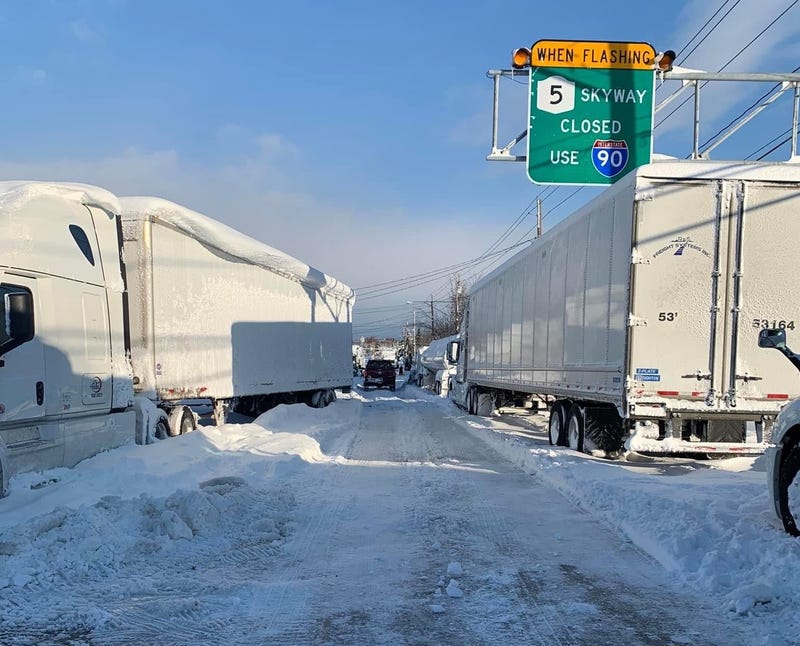
Buffalo, N.Y. (WBEN) - Ahead of this past weekend's lake effect snowstorm that dumped massive amounts of snow in certain portions of Western New York, Gov. Kathy Hochul announced the shutdown of the New York State Thruway to commercial traffic on Thursday afternoon at 4 p.m. EST.
With the shutdown of the Thruway to commercial traffic, it would not allow tractor trailer drivers or any other big rig vehicles to travel on Interstate-90 between Rochester and the New York/Pennsylvania border.

All of this was an effort to prevent a number of accidents on the Thruway involving tractor trailers that could have created a logjam on the roadways, leaving drivers and other passengers stranded in dangerous winter weather.
"We've seen so many times in past storms, and I've lived through all of them, that one tractor trailer jackknifing can paralyze an entire community for days. We prevented that," said Gov. Hochul during an appearance on WBEN with Tom Puckett on Saturday. "That's why it was important for us to keep the traffic off the roads, allowing us to clear, but also preventing those whiteout conditions where people can't see and they go off the road, and then that can be a life-threatening situation."
While the shutdown of commercial traffic, and eventually regular traffic on Friday, helped keep semi-trucks off the Thruway once conditions started to turn South late Thursday into Friday, it did create an unfortunate situation of tractor trailers trying to navigate other routes through towns and villages across the region.
According to the Governor on Friday night, the intersection of Route 20 and Eden Evans Center Road in Angola saw 70 tractor trailers and 10 passenger vehicles become stranded through the night. While state police went to their aid and offered help to drivers and passengers, every single one of those vehicles were in violation of a driving ban, at the time. It also diverted the state's resources from helping other residents and clearing roads to have to tend to those violating bans in place.
"Mother Nature is wildly unpredictable, and despite our best efforts to clear the roads, they get filled in just a few hours later, and we had to start all over again," Gov. Hochul said.
For those truck drivers and others who were in violation of the driving bans set in place through the storm, Gov. Hochul says it can lead to points on one's license. If it all adds up over time, it could then lead to a suspension of a license, keeping those drivers off the roads regardless of the conditions.
"We had over 350 truckers already cited, and that's way too high. These truckers received notice, we've been in contact with the National Trucking Association, the State Trucking Association. Everybody had warning, and even the Pennsylvania government, the state police there, the D.O.T. have been working to divert traffic before it even comes across the Pennsylvania line. So they've been incredibly helpful, I want to give a shout out to them, as well as our Canadian authorities," Gov. Hochul said on Saturday. "We've been trying to stop the flow of traffic coming in from those pressure points so people don't end up on our secondary roads, and creating the situation we have. But it was a complete driving ban. None of these vehicles should have been out there in the first place."
In a potential situation to, perhaps, avoid future problems with tractor trailers flooding residential and other localized traffic areas when inclement winter weather strikes, some are suggesting a potential shutdown of the New York State Thruway to regular traffic first may be a solution to ensure commercial traffic is through the region and not being forced into local municipalities.
However, as the Governor sees it, tractor trailers are the ones that create the greatest vulnerability on the roadways, which won't make much of a difference, especially if they are not cleared of the area when the winter weather strikes.
"We all remember the images of 2014 and earlier storms, where one jackknifed truck can literally block all the lanes in one direction on the Thruway. That's when you get people stranded in vehicles not just for hours, but sometimes for days," she said. "We prevented that, but also the passenger vehicles, you know what it's like to drive on the Thruway during the whiteout condition, or on the Skyway or other other major roads. It is so easy to go off the road, into a ditch, and not even be seen for a considerable amount of time, and that is also a life-threatening situation. We averted much of that, not all, because we had violators. But again, having a lot of experience with storms, my team is incredible. Our head of our State Police is Steve Nigrelli, who's from Western New York. He knows the streets, he knows these communities, and so we've made the best decisions with the information we had. We're going to continue to do everything we can to keep the public safe."
As for the professionals and those in charge of running the trucking companies, some feel the decisions made by the Governor and other local elected leaders in Western New York were the right call with the issuing of bans and road closures when they did.
"The one thing that impressed me through this whole ordeal was we obviously have an experienced group of people, who have been through many storms before, who had learn from their past mistakes, and who really did an outstanding job with this storm. They're to be applauded, really," said owner of Buffalo Transport Co., Brian Kimmins. "The County Executive [Mark Poloncarz], the Mayor [Byron Brown]. I was watching their news conferences, and you could tell they were seasoned pros, they had been through this before. They readily admitted that a lot of stuff they did is a result of past failures, so they've learned from their mistakes, and I think it showed."
While Kimmins admitted he had his doubts and disagreements with the Governor's call to close the Thruway at 4 p.m. EST, he understood it was a matter of handling the safety of not only the drivers, but also the general public.
"When I look back in retrospect, closing at 4 p.m. for a storm that wasn't going to hit until 7 p.m., it really didn't hit my neighborhood until about 8 p.m., and initially, I had a problem with it. But in retrospect, I think they probably made the right call, based on their experience with dealing with these types of storms for many years here," Kimmins said.
As he watched several of the news conferences with Gov. Hochul, Poloncarz and Brown, Kimmins knew the decision from elected leaders was based on what had happened in the past when they let the commercial trucks commingle with passenger vehicles. In some unfortunate cases, it led to fatalities on the roadways, which he agrees needs to be avoided at all costs.
"Being the owner of a pretty substantial trucking company here in Buffalo, I'm always going to err on the side of caution. When it comes to safety and saving lives, if you're inconveniencing a few people, then so be it," Kimmins said. "I'm just going to keep coming back to what I thought was very impressive about this whole thing: The leadership, they were upfront and honest about past failures, and they weren't going to let it happen again."
Perhaps what stood out the most to Kimmins with leaders learning from past mistakes was with response time to other snowstorms in the region. He says it was the Governor who really sent a proper message, especially with her having plenty of experience dealing with Western New York weather in years prior.
"She was very clear in years past, they would wait for the weather to hit before they called in the National Guard, they would wait for the weather to hit before they called in other communities to help with snow removal, and safety-related issues as a result of this event. I thought they were very proactive, and it was all based on their experience," Kimmins said. "You can say what you want about the politics, and there is a school of thought that maybe closing at 7 o'clock, or 4 o'clock like they did on [Thursday], had a little political vibe to it. But in the end, I've got to applaud these guys. We're all in this society where we're slamming our politicians, and I've been guilty of it. But you got to give these guys props. They were experienced professionals who weren't going to make the same mistakes that had been made in years past."
When it comes to trucking companies trying to dissuade their drivers from trying to travel through a region like Western New York during a winter weather event like this, Kimmins says the industry is no longer in the stone age, when it comes to worrying about drivers taking chances in certain conditions.
"We all have cutting edge technologies, and I'm sure many, many trucks re-routed their rigs to stay clear of this weather event," he said. "I'm sure that the trucks that were caught in it, they were probably beyond the point of no return. It's probably too late. They were probably already on the road, and here it comes.
"I can say as a lifelong resident of Western New York, and I'm 64 years old, there have been swing-and-misses by the weather forecasters. So I'm sure there was a group of people that said, 'You know what, I'm going to do what they've done in years past. I'm going to wing it, and then when the snow hits, I'll deal with it.' I'm sure there was some element of that, but I've got to believe that the vast majority of professional truckers stayed clear of our area, and anybody that was stuck in it was either a local trucker or didn't have time to get out of it. It was just too late and they were committed, and they're probably trying to beat the storm."
As the leader of a trucking company like Buffalo Transport Co., Kimmins knows that when the forecast starts to call for the potential of inclement weather that can shut down roadways in the region, it's about taking every step to get trucks back into the local area, and get their freight delivered before the roads closed.
"I listened, and I reacted. We reacted based on safety and what the professionals were telling us and what the models were saying," he said. "So we knew that the storm, they were talking about the storm getting here at 7 p.m. and they were closing the roads at 4 p.m. Well, they were closing the roads of 4 p.m., and if you remember, it was the I-90, the I-198, the Youngmann [I-290], everything was closed. The last thing we wanted here was to be one of those trucks that was stuck in it. So we took every step that we needed to take to get our trucks off the road by 4 o'clock."
More of our conversation with Kimmins is available in the player below:
